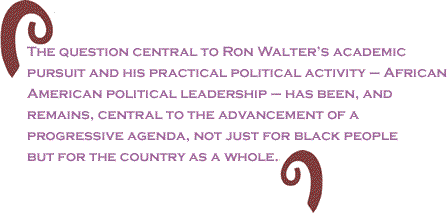The
question central to Ron Walter’s academic pursuit and his
practical political activity – African American political
leadership – has been, and remains, central to the advancement
of a progressive agenda, not just for black people but for
the country as a whole. Lord knows the country is now experiencing
a leadership crisis that is sometimes frightening.
The
late Paul Robeson had a useful comment on the quality and
integrity of leadership in the African American community.
In his 1958 book “Here I Stand,” he wrote: “The concept
that I am talking about has nothing to do with matters of
headline prominence, personal achievement, or popularity
with the powers-that-be. I am concerned, rather with Negro
leadership in the struggle for Negro rights. This includes
those who are directly in charge of organizations established
for such purposes, and many others as well – the leaders
of Negro churches, fraternal and civic organization, elected
representatives in government, trade union officials, and
others whose action or inaction directly affects our common
cause .” He went on to write, “The spirit of dedication
in the ranks of our people … is abundantly present in the
ranks of our people but progress will be slow until it is
much more manifest in the character of leadership.”
A
lot has changed since Robeson wrote those words, yet the
relationship between the leaders and the led, the multiplicity
of levels of leadership, and the notion of legitimacy derived
from the community as well as the top echelons, are very
contemporary and urgent. A few years ago Walters reflected
on this and extended the question to the matter of political
leadership in general. In 1989, he wrote:
“An
important consideration here is the nature of the relationship
between those who hold power and those for whom power is
held. The latter we might call ‘constituents,’ who are citizens
involved in a dignified and organic relationship with leaders
and who expect an empowering value in return for giving
their consent to be led. This consent must be voluntary,
it must be given with the expectation of reward, it must
be based on a trust that the leadership will be faithful
to the objectives and style of the collective, and it must
be predicated on the understanding that participation and
openness will be hallmarks of the governing process.”
He
went on to say: “The other aspect of legitimacy is that
leadership take place, as Max Weber indicated, within the
framework of a common set of norms, mores, customs, and
objectives of living. It is useful to recognize that legitimacy
is based upon norms that are socially valid and that are
truthful and morally grounded to the condition of the group
and its perspective. Leaders are often regarded as legitimate
if they operate within the context of a set of values that
are supported by their community.

“Thus,
autonomous actors, possessing a high degree of flexibility
with respect to tactics and to the pace of their agenda’s
implementation, may often draw a ‘bye’ on other elements
of the democratic process because some members of the collective
are more interested in different aspects of accountability.
Leaders are most accountable when they act in the interest
of the group from which they obtained their writ of legitimate
authority, as well as when they employ democratic aspects
of leadership, thereby increasing trust levels.”
The
thrust of Walter’s essay, “Legitimacy
to Lead,” was in response to the appearance of would-be
“conservative” leaders in the African American community
and the threat that “the contribution of legitimate black
leadership is repressed in favor of those new conservative
organizations and spokespersons who represent the ideology
of the dominant class.” This sets up “a politics of leadership
legitimacy within the black community,” he wrote. This is
worth recalling the next time we see a black person claiming
to represent the community speaking at a tea party rally.
And
Walters added another sharp and very timely observation
when he says, “the fact that minority groups who have a
disadvantaged status are trapped in the paradox and suffer
from its coercive effect represents a violation of democratic
norms” and asks, “For example, by what right is it legitimate
for blacks and Hispanics, the most presumptive beneficiaries
of affirmative action, to be deprived of it by the majority
on the basis of majority rule? Also, it may be asked, is
it legitimate for Hispanics, simply because of their ethnicity,
to be deprived by the majority of language rights and immigration
benefits on the basis of majority rule?
This
is only a small portion of the rich legacy – not all of
it uncontroversial – that Ron Walters leaves behind. I think
for those at the pinnacle of leadership and those of us
toiling in the valley an important admonition of Walters’
to keep in mind is this: “…In this sense, we must regard
leadership as process rather than a person. And when we
refer to leaders, especially heroic leaders, it may be more
accurate to regard them as one of the factors of monumental
forces involved in historical change, and therefore, as
symbols of those eras of change, rather than as the makers
of it altogether.”

Click
here
to send a condolence
message to the family of Ron Walters.
BlackCommentator.com Editorial
Board member Carl Bloice is a writer in San
Francisco, a member of the National
Coordinating Committee of the Committees of Correspondence
for Democracy and Socialism and formerly worked for a healthcare union. Click here to
contact Mr. Bloice. |

